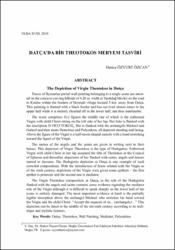Datça'da bir theotokos Meryem Tasviri
Özet
Traces of Byzantine period wall painting belonging to a single scene are attested on the concave-curving hillside of 4.20 m. width at Yarikdağ Mevkii on the road to Knidos within the borders of Hizirşah village located 5 km. away from Datça. This painting is framed with a black border and has survived almost intact in the upper half while it is entirely chiseled off in the lower half, and thus indefinable. The scene comprises five figures the middle one of which is the enthroned Virgin with child Christ sitting on the left side of her lap. Her halo is flanked with the inscription ? ??? ?????. She is flanked with the archangels Michael and Gabriel and then saints Demetrios and Polyeuktos, all depicted standing and facing. Above the figure of the Virgin is a half-moon shaped aureole with a hand stretching toward the figure of the Virgin. The names of the angels and the saints are given in writing next to their haloes. This depiction of Virgin Theotokos is the type of Hodegetria. Enthroned Virgin with child Christ in her lap assumed the title of Theotokos at the Council of Ephesus and thereafter, depictions of her flanked with saints, angels and donors started to increase. The Hodegetria depiction at Datça is one example of such crowded compositions. With the introduction of feasts related with the Virgin as of the sixth century, depictions of the Virgin were given some epithets - the first epithet is protector and the second one is mediator. The Virgin Theotokos composition, at Datça, in the role of the Hodegetria flanked with the angels and saints contains some evidence regarding the mediator role of the Virgin although it is difficult to speak sharply as the lower half of the scene is entirely damaged. The most important evidence at hand is the partially legible inscription above the archangel Michael who stretches his hand toward the Virgin and the child Christ: "Accept the requests of us... (archangels)..." This depiction can be dated to the middle of the eleventh century according to its technique and stylistic features. © 2010 Mersin/Türkiye.


















